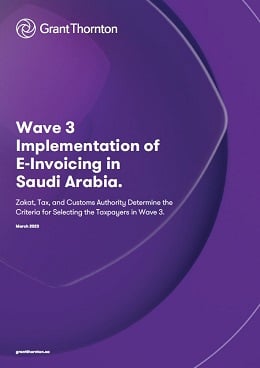Zakat, Tax and Customs Authority (ZATCA) determined the criteria for selecting the targeted taxpayers in the third wave for implementing the "Integration Phase" of E-invoicing, as it clarified that the third wave included all taxpayers whose revenues subject to VAT exceeded (250 Million Saudi Riyals) during 2021 or 2022. VAT-registered taxpayers meeting the criteria should integrate their e-invoicing solutions with (FATOORA) Platform starting from October 1, 2023.
ZATCA has stated that Phase Two (Integration Phase) requires additional requirements, the most prominent of which are to integrate taxpayers' e-invoicing solutions with ZATCA's platform (FATOORA), issue e-invoices based on a specific format, and include additional fields in the invoice. Furthermore, Phase Two (Integration Phase) of E-invoicing would take place gradually in waves and ZATCA would inform the subsequent waves directly at least six months before their Integration Date.
ZATCA has noted that the launch of Phase Two (the integration phase) is part of the economic development and digital transformation taking place in the Kingdom and is a continuation of the success story that began with Phase One of the implementation of e-invoicing, which achieved positive results, most notably raising the level of consumer protection in the Kingdom and on the other hand, praising the great awareness of taxpayers and the rapidity of the response in the implementation of Phase 1 (the generation phase).
It is worth mentioning that Phase 1 (Generation Phase) of E-invoicing was introduced on December 4, 2021, which obliges taxpayers subject to the E-invoicing Regulation to stop generating handwritten invoices or computer-generated invoices through text editing software and make sure that there is a technical solution for E-invoicing that is compatible with the requirements. In addition to generating and storing e-invoices with the required fields, including the QR code and other requirements.


